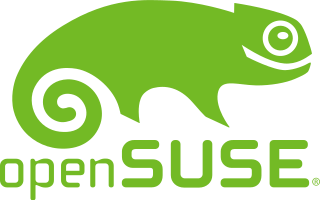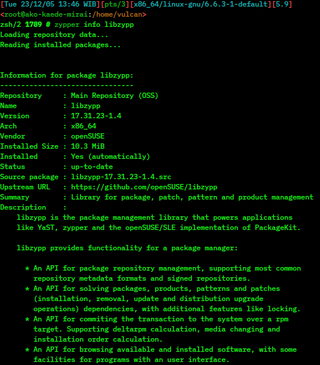Related Research Articles
In software development, agile practices include requirements, discovery and solutions improvement through the collaborative effort of self-organizing and cross-functional teams with their customer(s)/end user(s). Popularized in the 2001 Manifesto for Agile Software Development, these values and principles were derived from, and underpin, a broad range of software development frameworks, including Scrum and Kanban.
Technical variations of Linux distributions include support for different hardware devices and systems or software package configurations. Organizational differences may be motivated by historical reasons. Other criteria include security, including how quickly security upgrades are available; ease of package management; and number of packages available.
Thoughtworks is a publicly-traded, global technology company with 49 offices in 18 countries. It provides software design and delivery, and tools and consulting services. The company is closely associated with the movement for agile software development, and has contributed to open source products. Thoughtworks' business includes Digital Product Development Services, Digital Experience and Distributed Agile software development.

EQT is a Swedish global investment organization founded in 1994. Its funds invest in private equity, infrastructure, real estate, growth equity, and venture capital in Europe, North America, and Asia Pacific.

openSUSE is a free and open source Linux distribution developed by the openSUSE project. It is offered in two main variations: Tumbleweed, an upstream rolling release distribution, and Leap, a stable release distribution which is sourced from SUSE Linux Enterprise.

SUSE Linux Enterprise (SLE) is a Linux-based operating system developed by SUSE. It is available in two editions, suffixed with Server (SLES) for servers and mainframes, and Desktop (SLED) for workstations and desktop computers.

SUSE is a German-based multinational open-source software company that develops and sells Linux products to business customers. Founded in 1992, it was the first company to market Linux for enterprise. It is the developer of SUSE Linux Enterprise and the primary sponsor of the community-supported openSUSE Linux distribution project. While the openSUSE "Tumbleweed" variation is an upstream distribution for both the "Leap" variation and SUSE Linux Enterprise distribution, its branded "Leap" variation is part of a direct upgrade path to the enterprise version, which effectively makes openSUSE Leap a non-commercial version of its enterprise product.

Persistent Systems is an Indian multinational technology services company which was incorporated on 16 May 1990. Persistent Systems is listed on the Bombay Stock Exchange and the National Stock Exchange. Shares in the company were listed on the National Stock Exchange of India in March 2010.
SUSE Linux is a computer operating system developed by SUSE. It is built on top of the free and open source Linux kernel and is distributed with system and application software from other open source projects. SUSE Linux is of German origin, its name being an acronym of "Software und System-Entwicklung", and it was mainly developed in Europe. The first version appeared in early 1994, making SUSE one of the oldest existing commercial distributions. It is known for its YaST configuration tool.

ZYpp is a package manager engine that powers Linux applications like YaST, Zypper and the implementation of PackageKit for openSUSE and SUSE Linux Enterprise. Unlike some more basic package managers, it provides a satisfiability solver to compute package dependencies. It is a free and open-source software project sponsored by SUSE and licensed under the terms of the GNU General Public License v2 or later. ZYpp is implemented mostly in the programming language C++.

MeeGo is a discontinued Linux distribution hosted by the Linux Foundation, using source code from the operating systems Moblin and Maemo. MeeGo was primarily targeted at mobile devices and information appliances in the consumer electronics market. It was designed to act as an operating system for hardware platforms such as netbooks, entry-level desktops, nettops, tablet computers, mobile computing and communications devices, in-vehicle infotainment devices, SmartTV / ConnectedTV, IPTV-boxes, smart phones, and other embedded systems.
DevOps is a methodology in the software development and IT industry. Used as a set of practices and tools, DevOps integrates and automates the work of software development (Dev) and IT operations (Ops) as a means for improving and shortening the systems development life cycle.

OpenStack is a free, open standard cloud computing platform. It is mostly deployed as infrastructure-as-a-service (IaaS) in both public and private clouds where virtual servers and other resources are made available to users. The software platform consists of interrelated components that control diverse, multi-vendor hardware pools of processing, storage, and networking resources throughout a data center. Users manage it either through a web-based dashboard, through command-line tools, or through RESTful web services.
CloudStack is open-source Infrastructure-as-a-Service cloud computing software for creating, managing, and deploying infrastructure cloud services. It uses existing hypervisor platforms for virtualization, such as KVM, VMware vSphere, including ESXi and vCenter, XenServer/XCP and XCP-ng. In addition to its own API, CloudStack also supports the Amazon Web Services (AWS) API and the Open Cloud Computing Interface from the Open Grid Forum.
kGraft is a feature of the Linux kernel that implements live patching of a running kernel, which allows kernel patches to be applied while the kernel is still running. By avoiding the need for rebooting the system with a new kernel that contains the desired patches, kGraft aims to maximize the system uptime and availability. At the same time, kGraft allows kernel-related security updates to be applied without deferring them to scheduled downtimes. Internally, kGraft allows entire functions in a running kernel to be replaced with their patched versions, doing that safely by selectively using original versions of functions to ensure per-process consistency while the live patching is performed.
kpatch is a feature of the Linux kernel that implements live patching of a running kernel, which allows kernel patches to be applied while the kernel is still running. By avoiding the need for rebooting the system with a new kernel that contains the desired patches, kpatch aims to maximize the system uptime and availability. At the same time, kpatch allows kernel-related security updates to be applied without deferring them to scheduled downtimes. Internally, kpatch allows entire functions in a running kernel to be replaced with their patched versions, doing that safely by stopping all running processes while the live patching is performed.
Bane NOR SF, formerly Jernbaneverket, is the Norwegian government agency responsible for owning, maintaining, operating and developing the Norwegian railway network, including the track, stations, and the majority of other infrastructure assets.

GeckoLinux is a Linux distribution based on openSUSE. It is available in two editions: Static, which is based on openSUSE Leap, and Rolling, which is based on openSUSE Tumbleweed.
Harvester is a cloud native hyper-converged infrastructure (HCI) open source software. Harvester was announced in 2020 by SUSE.
References
- ↑ "Agile Infrastructure". www.diaxion.com. Diaxion. Retrieved April 25, 2020.
- ↑ "Agile IT Infrastructure". susedefines.suse.com. Suse. Retrieved April 25, 2020.